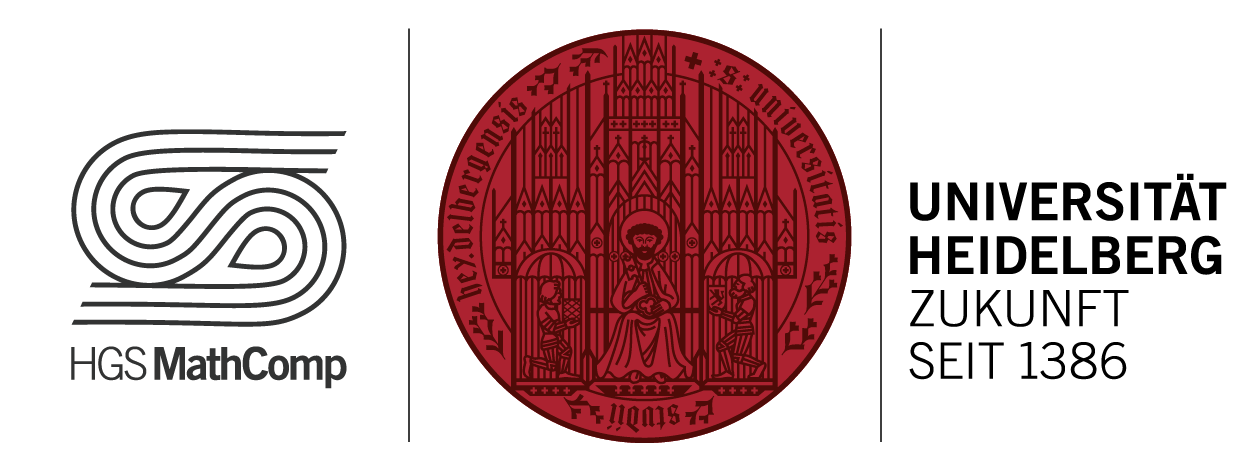HGS MathComp - Where Methods Meet Applications
The Heidelberg Graduate School of Mathematical and Computational Methods for the Sciences (HGS MathComp) at Heidelberg University is one of the leading graduate schools in Germany focusing on the complex topic of Scientific Computing. Located in a vibrant research environment, the school offers a structured interdisciplinary education for PhD students. The program supports students in pursuing innovative PhD projects with a strong application-oriented focus, ranging from mathematics, computer science, bio/life-sciences, physics, and chemical engineering sciences to cultural heritage. A strong focus is put on the mathematical and computational foundations: the theoretical underpinnings and computational abstraction and conception.
HGS MathComp Principal Investigators are leading experts in their fields, working on projects that combine mathematical and computational methodology with topical research issues. Individual mentoring for PhD candidates and career development programs ensure that graduates are fully equipped to take up top positions in industry and academia.
Location: Online
Registration: Please register on the event website
Organizer: Graduate Academy
The latest information and a registration link are available on the course website (log in with Uni-ID).
HGS MathComp fellows can get a reimbursement of the course fees. Please submit your proof of payment and certificate of participation to hgs@iwr.uni-heidelberg.de.
During the workshop, participants work with their own texts as well as with examples from their own disciplines that they bring along and consider to be particularly well written. They discuss features of good scientific papers and are equipped to use adequate language in different genres and for different audiences. In addition, they receive peer feedback on their own drafts. All exercises empower them to produce clearer, and more correct, concise, and reader-oriented papers.
The two-day workshop covers the following topics:
• taking inventory: participants‘ strengths and challenges in writing scientific papers in English
• a brief introduction to research and writing processes
• using text analysis to become a better writer
• reporting findings, ideas, and opinions professionally and adequately
• making yourself understood: principles of clear and concise writing
• structuring ideas, organising texts: transitions, connectives, & co.
• working effectively with co-authors and constructive text feedback
• useful online and offline resources
(After the workshop, participants have the opportunity to sign up for an individual writing coaching, or text feedback session. In this session, they can ask for individual feedback on an extract of their written work, or get deeper into issues from the workshop in a one-on-one setting.)
Location: Max Planck Institute for Mathematics in the Sciences • Leipzig, Germany
Registration: Please register on the event website • Application open until May 31, 2025
Organizer: Max Planck Institute for Mathematics in the Sciences • STRUCTURES Cluster of Excellence
The workshop will feature 10 keynote talks and 20 presentations by leading experts. By merging the Workshop on Geometry in Machine Learning (GaML) and the Workshop on Topological Methods in Data Analysis (TMDA), GTML creates a platform to foster collaboration and explore the interplay between geometry, topology, and machine learning.
- Mathematical foundations of machine learning
- Geometric machine learning (e.g., geometric deep learning, graph neural networks, geometry processing)
- Topological machine learning (e.g., topological deep learning, topological data analysis (TDA), shape analysis)
- Applications of geometry and topology in machine learning (e.g., in life sciences and complex systems)
For more information, please visit the event website.
09:00 - 17:00
Location: In-Person in Heidelberg
Registration: Please register on the event website
Organizer: Graduate Academy
The latest information and a registration link are available on the course website (log in with Uni-ID).
HGS MathComp fellows can get a reimbursement of the course fees. Please submit your proof of payment and certificate of participation to hgs@iwr.uni-heidelberg.de.
Description
The first day of the seminar begins with verbal and non-verbal communication training, connecting breathing to thinking, in order to relieve panic in stressful situations. This is followed by training with improvisation exercises to help presenters maintain their focus and composure and to cultivate quick thinking and problem solving, followed by free-speaking exercises to train quick thinking, staying focused, engaging an audience in a topic, and maintaining authority. Strategies are then discussed and practiced to deal with disruptions during the impromptu talks.
In the second session, participants will explore various challenges in meetings as well as in online Q&A sessions. Techniques are trained to handle awkward situations. Role-play situations are tailored, practiced, and discussed in the roles as presenters, meeting facilitators and Q&A moderators.
Contents in brief
- Breathing and focusing exercises for stress management
- Free-Speaking Exercises
- Improvisation Techniques for quick thinking and problem solving
- Role-play disruptions during talks, meetings, and discussions
- Tailored coaching and individual feedback
Methods
- Individual, pair and group working exercises
- Breakout room activities
- Voice and non-verbal communication coaching
- Improvisation techniques
- Role-play exercises and discussion


